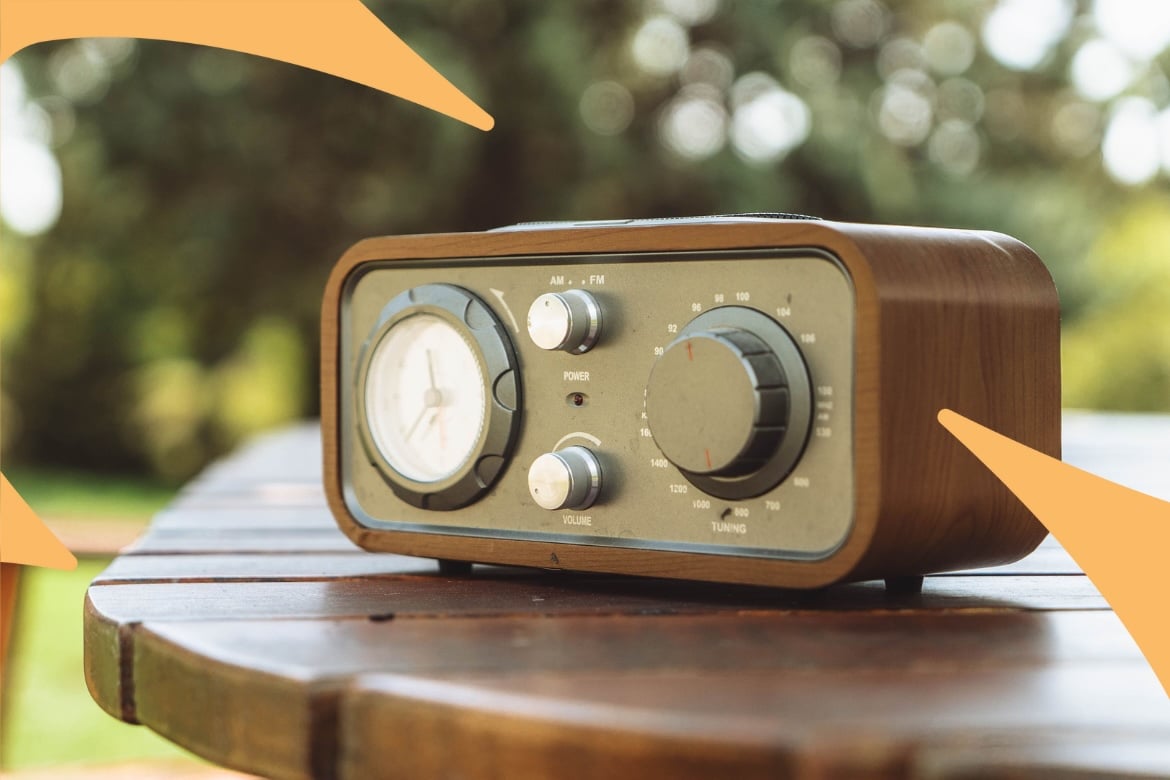There are thousands of radio stations broadcasting around the globe, including online and satellite radio stations. More than 90% of the world’s population tunes in to the radio at least once a week, making it a valuable platform for reaching a large audience.
Though the radio almost primarily include big artists, alternatives have been put in place to encourage the discovery of new artists – including Groover, which provides emerging artists with access to the best radio stations, media, and music industry professionals with a 7-day response guarantee.
—
Want to get in touch with radio stations? ⬇️
—
Getting on radio stations, broadcasting your songs on FM and getting people to listen and download music remains an indispensable lever to propel your music career. But how do you get there? Below, we explain in detail how to get on the radio.
Why Radio is Still Important
Discovery
Traditional media such as press and music blogs have lost their allure over the years, and their role in making one’s music heard as dwindled. On the other hand, in the face of competition from free music streaming platforms, radio remains a primary source of music discovery in popular music as well as an excellent promotional tool. Over 95% of music played on commercial radio now comes from digital distribution, and the decision-making process for selecting songs for airplay is crucial for getting your music played.
Converting to Streams
Radio listening can be an either passive or active activity — and both can benefit you! Music apps like Shazam allow your new fans to find you easily using an audio fingerprint of your track. They can then listen to your music over and over again on music streaming services like Spotify, Apple Music, Amazon Music, Deezer, Youtube Music, and others via the seamless integrations between Shazam and these music streaming services. New music discoveries are made constantly as a result of having the radio on, whether it’s background noise or the soundtrack to the car ride.
The Exposure Effect
You’ve probably experienced hearing a song and not falling in love with it instantly, but gravitating towards it more and more over time. This is the exposure effect. The more familiar a song gets to listeners, the more they’ll want to hear it or sing along. A station’s music selection depends on the musical genre they specialize in, but once you get your song played, it’s likely that it’ll be played more than a couple times (which will also generate more performance royalties for you).
Here are 8 tips for how to get your music on the radio and share it with a whole new audience.

1. Pitch Yourself to Radio Programmers
Before approaching any music industry professional, you must have a couple things down before presenting yourself to them. Referring to the following criteria can help:
- Have an electronic press kit (EPK) at your disposal, and if not, a solid biography presenting your project and your background
- Build a strong visual identity to support your musical project
- Be active and have a solid foundation on social networks (TikTok, Instagram etc.)
- Make sure your sound recordings are of impeccable quality (.wav, 16bits, 44100Hz).
- Fill in the metadata of your tracks (digital information about the music: title, performer, author, composer, producer, ISRC code…)
A press kit is the best way to show a new listener what you and your music are all about. It is essentially a brochure outlining who you are as an artist and what kind of music you make, all while including information about your streaming stats, past gigs, and other accolades. Getting in touch with the music director at radio stations can significantly increase your chances of getting your songs played on the air, so be ready to show them what you’re bringing to the table.
Though it is important to cover as many of these criteria as you can, keep in mind that the most important, especially for radio play, is sound quality. After all, it’s the only remaining medium with no visuals!
Having your track metadata in order is very important. You will not get your song played if you are unorganized regarding song credits and registration with royalty collection agencies. Without it, you won’t be able to get paid.

Page from Dua Lipa’s 2016 EPK

Social media page from Dua Lipa’s 2016 EPK
See as well: How to write a good biography?
2. Choose The Right Song
You absolutely must submit a song to radio stations that is high quality. It has to have gone through every stage of musical creation: composing, producing, arranging, vocal recording, mixing, mastering, etc. The challenge here is to select a track that is both representative of your musical style and also has strong potential. More simply, it is your “big hit”.
As an indie artist, you have something big artists that are signed to record labels don’t: complete creative control over what music you want to release. The freedom is amazing, though you should ask people you trust to tell you which of your tracks they could envision getting radio plays the most. It’s likely that your current favorite song on the radio is one that is catchy and has a lot of repetition. And because it gets lots of radio plays, everyone around you knows the words. Sift through your new music to figure out what could fit that format best.
3. Adhere to Radio File Formats
Take into account the length of your track. Your track should last between 2 and a half minutes and 4 minutes (2:30-4:00) long. Beyond that, your chances of getting on the airwaves are limited.
Of course, we do not advise you to restrict your artistic creation. Still, we recommend that you produce a “radio edit” version of your single just in case. A radio edit is a version specially adapted for radio broadcasting, respecting the duration format and excluding any curse words/potentially inappropriate material. This version is also very often used for music videos. One of the most famous examples is Daft Punk’s One More Time, whose radio edit version has a radically different structure than the album version.
4. Respect Language Laws
To get radio promotion, it’s worth looking into whether your country/region has language quotas. Since they affect whether your track will be played on the radio, quotas are one thing that can’t be overlooked. For example, if your album release includes tracks in a mix of languages, it often makes sense to promote the one in your primary language. However, music is more global than ever, so you actually may have a better chance of getting certain language tracks onto national and international radios!
5. Target the Right Radio Station
Every radio station has its own audience and musical genre of preference. Your music must appeal to the radio programmers at the station, so choose stations that play music within the same realm as yours. If your track covers multiple genres, reach out to stations that feature similar songs. Many musicians are hybrid musicians who don’t fit nicely into one genre, so ask around to find out how others perceive your style of music if you’re unsure how to classify it.
There are also different types of radio stations to be aware of. If you are able to target one or more stations for each of the following categories, you’re off to a great start:
- commercial radio stations
- independent radio stations
- college radio stations
- streaming platform radio stations
- online radio stations
Online or internet radio is gaining momentum and providing a new outlet for emerging artists. The digital format makes it easier than ever to access the airways and listen to the radio on a mobile device. In addition to web radio, streaming platforms like Spotify and Apple Music have in-platform radio play available, where you can create your own station based on a song or artist of your liking. This is another reason why increasing your fanbase on streaming services is key!
Thanks to an efficient and particularly affordable concept, Groover offers users the opportunity to contact the best radio stations with the guarantee of being listened to and receiving feedback.
6. How to Get In Touch
Social Networks
Social networks are the place for promo for artists as well as for radio stations. It can be overwhelming for stations to handle the influx of messages they get from artists, fans, partners, and others. However, you can still try to send them a concise message asking for the contact info of the person in charge of the radio’s programming.
If you want to take it even further, find an employee’s LinkedIn and send them a quick message over there. This is more professional than an Instagram DM, and still goes directly into their inbox.
E-mail is the traditional way to send your music to radio stations. A clear and concise message that is pleasant to read will prompt curiosity. Write a solid pitch of your song and include links to your music and all streaming platform artist pages of yours.
Radio Station Websites
Some radio stations’ websites accept submissions, so look for a “contact” section you could send a message through. By doing so, it will be sent directly to the radio station’s programming department. From there, a radio programmer can review your message and decide whether or not to respond. Many radio stations now accept music submissions through their website or online submission services like SharePro, TuneCore, or ReverbNation.
On Groover
The only way to be sure that your music will be heard and get feedback is by a platform that makes sure radio stations will listen to you and respond. The music promotion platform Groover allows you to contact radio stations that are adapted to your music style, with simple ways to filter by genre, country, or other parameters.
7. Follow Your Radio Airplay With a Tracking Tool
There are several paid tools that allow you to track your songs on the radio. Among them, we have chosen WARM, an innovative service created in Denmark, as our recommendation for tracking radio play. Thanks to audio fingerprinting technology, the platform tracks the songs played on more than 25,000 radio stations in the world, and for a reasonable price, allows you to discover unexpected radio passages. It’s great way to adapt your music promotion strategy by targeting specific stations or markets when a new song is released.
8. Understand the Game
Don’t be discouraged if you don’t get your song on air. Unfortunately, major labels do control a lot of what music gets played. This is why pitching to smaller stations to begin with is a must. It’s easy to want to catch the big fish first. Show the bigger stations why you deserve a spot on their rotation by building a track record of radio play on a number of other stations before reaching out!
– Article written by Amy Cimpaye in its original version, translated by Mackenzie Leighton –
—


